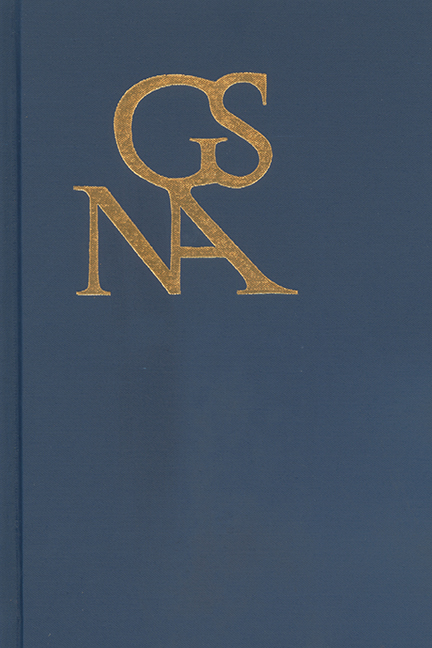Book contents
- Frontmatter
- Contents
- Building Bridges: Goethe's Fairy-Tale Aesthetics
- Goethe as Mystagogue
- Observing Neutrality, circa 1800
- Goethe, Faust, and Motherless Creations
- Impossible Ideals: Reconciling Virginity and Maternity in Goethe's Werther
- Kant, Calculus, Consciousness, and the Mathematical Infinite in Us
- The Classical Aesthetics of Schlegel's Lucinde
- Special Section on Visual Culture in the Goethezeit
- Acquaintance with Color: Prolegomena to a Study of Goethe's Zur Farbenlehre
- “Hamiltonian-Hendelian” Mimoplastics and Tableau of the Underworld: The Visual Aesthetics of Goethe's 1815 Proserpina Production
- J. W. Goethe and C. G. Carus: On the Representation of Nature in Science and Art
- Brentano's Remains: Visual and Verbal Bricolage in Gockel, Hinkel und Gackeleia (1838)
- A Book of Living Paintings: Tableaux Vivants in Goethe's Die Wahlverwandtschaften (1809)
- Book Reviews
J. W. Goethe and C. G. Carus: On the Representation of Nature in Science and Art
from Special Section on Visual Culture in the Goethezeit
Published online by Cambridge University Press: 25 February 2017
- Frontmatter
- Contents
- Building Bridges: Goethe's Fairy-Tale Aesthetics
- Goethe as Mystagogue
- Observing Neutrality, circa 1800
- Goethe, Faust, and Motherless Creations
- Impossible Ideals: Reconciling Virginity and Maternity in Goethe's Werther
- Kant, Calculus, Consciousness, and the Mathematical Infinite in Us
- The Classical Aesthetics of Schlegel's Lucinde
- Special Section on Visual Culture in the Goethezeit
- Acquaintance with Color: Prolegomena to a Study of Goethe's Zur Farbenlehre
- “Hamiltonian-Hendelian” Mimoplastics and Tableau of the Underworld: The Visual Aesthetics of Goethe's 1815 Proserpina Production
- J. W. Goethe and C. G. Carus: On the Representation of Nature in Science and Art
- Brentano's Remains: Visual and Verbal Bricolage in Gockel, Hinkel und Gackeleia (1838)
- A Book of Living Paintings: Tableaux Vivants in Goethe's Die Wahlverwandtschaften (1809)
- Book Reviews
Summary
CARL GUSTAV CARUS (1789–1869), scientist (doctor of medicine and surgeon) and painter, corresponded with Johann Wolfgang von Goethe (1749–1832) for some ten years, in particular between 1818 and 1828, when they exchanged not only letters and essays but also paintings and curious objects, including optical devices and drawings with commentaries about roots, bones, fossils, and other natural phenomena. In the following, I argue that there was an understanding and deep connection between them, which persisted until Goethe's death in 1832. In this, my reading differs from that of Stefan Grosche. While his research on the Goethe-Carus connection is pathbreaking, Grosche mistakenly argues that there was a break in their relationship in the middle of 1831 (“Zarten Seelen,” 99). But as I will show, the strength of Carus's lasting attachment to Goethe is evident in a series of publications that appeared after Goethe's death and in his artworks, including a series of six works in charcoal that were inspired by Goethe's Faust and completed after 1851.
The correspondence between Goethe and Carus not only is of biographical value for both individuals but also provides important material for a more accurate assessment of how Goethe and Carus approached the representation of nature in art and in science. In the following, I will investigate their respective approaches to science and their writings on the visual, color, and painting. I will also discuss Goethe's changing relationship to Romanticism and Goethe's and Carus's views on the relative merits of music, painting, and poetry and on the relation between art and psychology. I conclude with an analysis of some paintings that Carus produced shortly after Goethe's death and presented in his honor.
Goethe and Carus on Science
Goethe and Carus shared an intimate personal and intellectual bond, based on their keen interest in morphology and a love of observing nature in process. Both conducted research in botany, zoology, and geology, and both believed that nature is always changing. They believed that nature preserves energy by transferring it from one life-form to another via metamorphosis.
- Type
- Chapter
- Information
- Goethe Yearbook 23 , pp. 195 - 220Publisher: Boydell & BrewerPrint publication year: 2016



